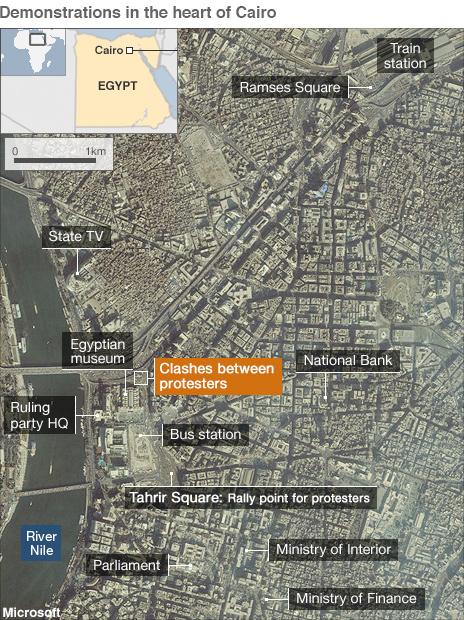Egypt unrest: deadly clashes rock Cairo's Tahrir Square
- Published
The struggle for control of the future of Egypt continued in Cairo
Three people have been killed and at least 600 wounded during fierce clashes in Cairo between supporters of Egyptian President Hosni Mubarak and anti-government protesters, officials say.
Gunfire was heard as rival groups of stone-throwing demonstrators fought pitched battles in and around the city's Tahrir Square.
The army has urged people to go home.
The protesters are demanding President Mubarak's resignation. He has vowed not to seek re-election in September.
Wednesday's violence came after more than a week of demonstrations that have left about 300 people dead, according to UN estimates.
Counter-protests
Up to 2,000 anti-Mubarak demonstrators had spent Tuesday night in Tahrir Square, the main focus of the protests, saying the president's pledge was insufficient and chanting: "We will not leave!"
On Wednesday, thousands of supporters of President Mubarak arrived in buses and surged into the square, dismantling barricades.
"Let the man (Mubarak) take care of you until his time is up," Mohamed Shafik, 51, told Reuters news agency. "Mubarak wants stability and we want stability as well."
One anti-government protester told the BBC that pro-Mubarak activists had initiated the violence.
"They started throwing stones at us," the man, named as Zaccaria, said. "Then some of us started throwing stones at them and then we chased them out of the square. They returned once again with the horses and the whips and the thugs."
Opposition supporters say many in the pro-government camp were paid by the authorities to demonstrate, and allowed into the square by the troops surrounding it.
Repeated bursts of gunfire have been heard. Some reports say troops fired warning shots to disperse the crowds.
Ibrahim Zadran, co-ordinator of the opposition National Association for Change, told the BBC that some pro-government activists had used firearms and shot 15 protesters.
BBC Middle East editor Jeremy Bowen, who has been to Tahrir Square, said he had seen people with nasty wounds.
Egyptian Health Minister Ahmed Sameh Farid told the Associated Press news agency a member of the security forces died when he fell off a bridge.
Two other people died from unspecified wounds in hospital, he added. It was not clear whether they were critics or supporters of Mr Mubarak.
As darkness fell, people were seen throwing rocks and petrol bombs from rooftops on to the protesters below.
The clashes later died down, although there were petrol bomb incidents into the night. Many anti-government protesters remain in Tahrir Square.
The BBC's Yolande Knell in Cairo says the situation remains tense there as fires continue to burn outside the museum building.
International reactions
Clashes between the rival groups were also reported in Egypt's second city, Alexandria.
Late on Wednesday Vice-President Omar Suleiman urged "all citizens to return to their homes and abide by the curfew".
The violence drew condemnation from British Prime Minister David Cameron.
"If it turns out that the regime in any way has sponsored or tolerated this violence, that is completely unacceptable," he said after meeting UN Secretary General Ban Ki-moon in London.
Mr Ban said: "Any attack against the peaceful demonstrators is unacceptable and I strongly condemn it."
In Washington, the state department reiterated a call for all sides to show restraint.
In its earlier statement, Egypt's army called for demonstrators to return to their homes.
"Your message has arrived, your demands became known... you are capable of bringing normal life to Egypt," said a spokesman in a message broadcast on state television.
In a speech on Tuesday night Mr Mubarak - who has been in office for nearly 30 years - promised to leave at the next polls and pledged constitutional reform.
He said he would devote his remaining time in power to ensuring a peaceful transition.
US President Barack Obama responded by saying an orderly transition "must begin now".
Opposition leader Mohamed ElBaradei dismissed Mr Mubarak's move as "a trick" to stay in power, and Tahrir Square protesters have vowed to continue their demonstrations until Mr Mubarak quits.
Abdelhalim Kandil, leader of Egypt's Kifaya (Enough) opposition movement, said Mr Mubarak's offer not to serve a sixth term was not enough.
"I will tell you very simply that there is an unprecedented popular movement that rejects the presence of the president on a scope that has not been seen before, that is calling for the will of the people to be imposed," he said.
If Mr Mubarak does not step down, demonstrators have planned to march on the presidential palace.
Meanwhile, internet services were returning to the country, having been cut off for days by the government.
